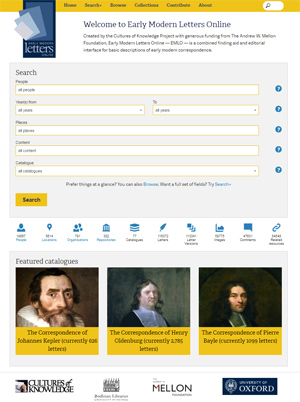 Of course eagle-eyed users will have spotted already significant new-year additions to existing catalogues in EMLO: as of this week, the calendar of Henry Oldenburg’s correspondence extends to the end of July 1675 (with only two more of the Halls’ volumes to go, and just over two-years’ worth of letters to take the calendar to completion, we’re looking forward to celebrating Oldenburg and his correspondence later this year); Pierre Bayle’s correspondence in EMLO has been augmented with volumes eight and nine of the Voltaire Foundation’s truly magnificent Correspondance de Pierre Bayle, compiled and edited under the direction of †Elisabeth Labrousse and Professor Antony McKenna; and, thanks to the wonderful collaboration between Professor Adam Mosley and Dr Francesco Barrecca, Johannes Kepler’s catalogue now includes metadata from the letters in volume XVI of Max Caspar’s Gesammelte Werk.
Of course eagle-eyed users will have spotted already significant new-year additions to existing catalogues in EMLO: as of this week, the calendar of Henry Oldenburg’s correspondence extends to the end of July 1675 (with only two more of the Halls’ volumes to go, and just over two-years’ worth of letters to take the calendar to completion, we’re looking forward to celebrating Oldenburg and his correspondence later this year); Pierre Bayle’s correspondence in EMLO has been augmented with volumes eight and nine of the Voltaire Foundation’s truly magnificent Correspondance de Pierre Bayle, compiled and edited under the direction of †Elisabeth Labrousse and Professor Antony McKenna; and, thanks to the wonderful collaboration between Professor Adam Mosley and Dr Francesco Barrecca, Johannes Kepler’s catalogue now includes metadata from the letters in volume XVI of Max Caspar’s Gesammelte Werk.
And then followers of Twitter may have realised we’ve been equally busy shaping collaborations for the years ahead. Last week we hosted here at Oxford’s Faculty of History a workshop for a group of eleven volunteers from Huygens ING which, under the direction of project leader and researcher Dr Ineke Huysman, is embarking upon the collation of a calendar for Dutch Grand Pensionary Johan de Witt’s extremely large correspondence. Whilst primarily diplomatic and administrative in their subject matter, these letters include also De Witt’s exchanges with a number of scholars as well as his personal correspondence. With political and economic complications intensifying these days at every turn, we are immensely proud and fortunate to be involved in so many early modern pan-European collaborations. Surely the intelligencers Oldenburg and Bayle would have been supportive of what we’re working so hard to achieve with EMLO, and both our own Andrew W. Mellon-funded Culture of Knowledge project and the pioneering COST Action Reassembling the Republic of Letters, also headed by our CofK project director Professor Howard Hotson, have a more crucial role to play in today’s world of change than we could possibly have envisaged a couple of years ago.
